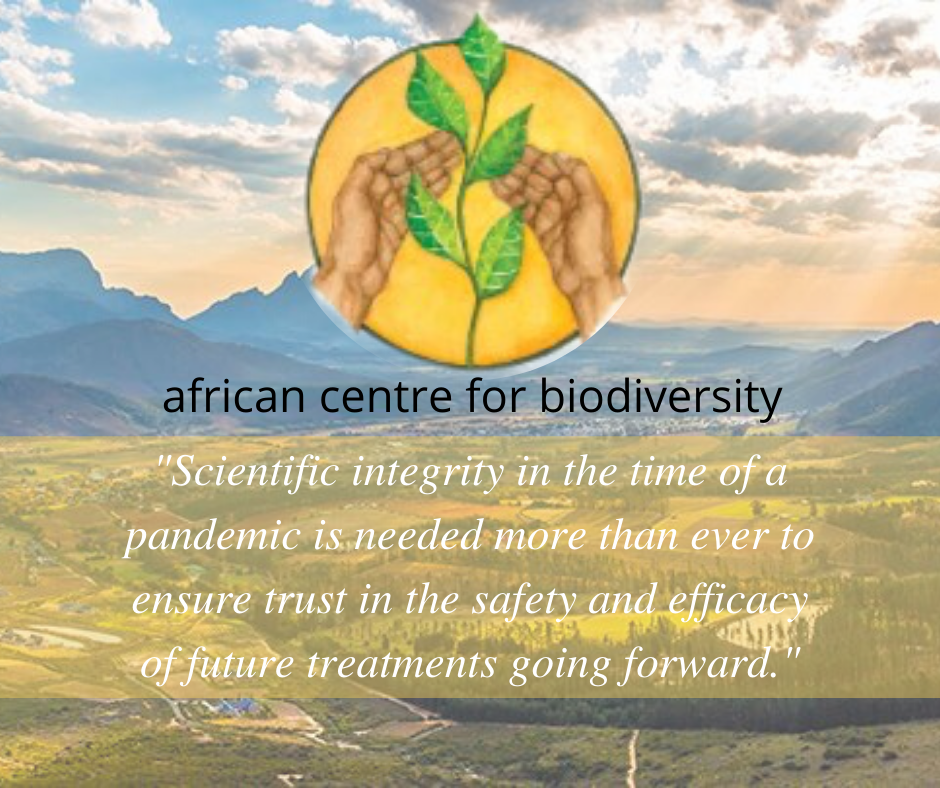The African Centre for Biodiversity (ACB) raises concerns on GM Covid-19 vaccine trials for South Africa, calls for transparency & public hearings
NEWS RELEASE: published today at https://www.acbio.org.za/en/about/acb
The African Centre for Biodiversity (ACB) has made a submission to the Registrar of GMOs in South Africa, following an application made by Professor Shabir Ahmed Madhi, from the Respiratory and Meningeal Pathogens Research Unit (RMPRU), Chris Hani Baragwanath Academic Hospital, for approval for release of ChAdOx1 nCo-V-19, a genetically modified (GM) vaccine, for clinical phase I/II trials on 2 800 both healthy and HIV-positive adults over a period of 12 months.
This submission is made in the public interest, as the ACB, and also in the context of the ACB sharing the global community’s common sense of urgency to find long-term life-saving solutions to the current pandemic. However, while effective treatments are being developed as rapidly as possible, this cannot and should not come at the cost of the highest standards of safety, efficacy, transparency, and ethics in clinical research.
These trials are to take place in three locations in the province of Gauteng: Respiratory and Meningeal Pathogens Research Unit (RMPRU), Chris Hani Baragwanath Academic Hospital; Wits RHI Shandukani Research Centre and Setshaba Research Centre.
In its submission, the ACB has raised several concerns, which include the following:
- Non-disclosure of vital safety data and information, which have been redacted as ‘confidential business information’
- Lack of literature references throughout to substantiate health and ecosystem safety claims, making it difficult to evaluate some of the claims being made as to safety
- Lack of evidence of efficacy of the trials
- Lack of information on the test procedures being used
- Concerns regarding the safety claims made
Scientific integrity in the time of a pandemic is needed more than ever to ensure trust in the safety and efficacy of future treatments going forward. We strongly urge that full public participation in the decision-making process governing fair administrative procedures is not sacrificed.
With any treatment, whether it is a drug or non-therapeutic intervention, such treatments must be designed as a public good, with full access to information, underpinning any project and its progress through the stages of research to clinical approval.
We call upon the Executive Council: GMO Act (EC) to ensure that the applicant ensures full disclosure of the safety data and information to the public to enable us to exercise our rights to administrative justice.
Further, the public has the right to fair administrative decision-making and the right to democratic participation. We are of the view that these rights of the public cannot be said to be upheld unless there is full and meaningful public participation and that decision-making is done in a procedurally fair, open and transparent manner. In this regard, we strongly urge the EC to set up an independent panel comprised of multi-disciplinary experts to conduct an open and transparent process to assist the EC in reviewing this application and to conduct public hearings in an open and transparent way, on the concerns being raised in this submission and that may be raised by other sections of the South African society, online still in June 2020.
Click here to read the submission.
Click here for the public notice of the application.
About ABC (from their website)
ACB was established in 2003 in Johannesburg, South Africa, and registered in 2004. Previously named the African Centre for Biosafety, the name change was effected in April 2015, to reflect the expanded scope of the ACB’s work over the past few years beyond biosafety. ACB has a long and respected track record of research and advocacy. Our current geographical focus is Southern and East Africa, with extensive continental and global networks. We do research and analysis, advocacy and skills sharing and seek to inform and amplify the voices of social movements fighting for food sovereignty in Africa.
ACB’s three programme areas are Biosafety, genetic modification and second generation GM technologies; Seed sovereignty; and Opposing corporate expansion in African agriculture.

